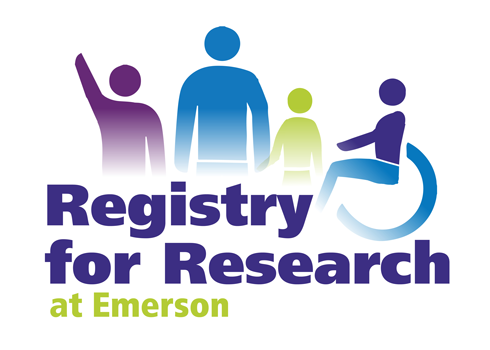Research in Communication Sciences and Disorders (CSD) focuses on the emergence, use, loss and reacquisition of human communication and swallowing skills across the lifespan, as well linguistic and cultural differences in how individuals communicate. Much of this innovative research is carried out in our state-of-the-art CSD Research Suite.
Emerson undergraduate and graduate students are strongly encouraged to become involved in faculty research. Opportunities may include:
- Volunteer research assistantships;
- Paid research assistantships (through Emerson Student Employment);
- Clinical research within the Robbins Speech Language and Hearing Center (RSLHC)
- Presentations at professional conferences;
- Master's theses;
- School of Communication Research Co-curricular (SOC 320).
If you are a student interested in getting involved in research in CSD, please contact the relevant faculty member(s) for more information.
If you are a community member interested in participating in CSD research at Emerson, you can sign up for future studies at our Registry for Research. A researcher will be in touch when you are eligible for a study.
Faculty Research
Nydia Bou's research interests include the development of tools and methods for the analysis and treatment of Spanish phonological deviations. Her past research focused on establishing the development of phonological patterns and the elimination of deviations for Puerto Rican Spanish speaking children. She also investigated the development of syllable structures of Puerto Rican children. Nydia’s interest includes the use of qualitative methods to describe communication phenomena and the impact of communication disorders in the quality of life and on family systems. She has also developed undergraduate research programs to support undergraduate students interested in research and graduate studies.
Robin Danzak uses qualitative and mixed methods to explore multilingual language, literacy, and the relationships among writing, culture, and identity of bilingual adolescents and adults. Robin engages participants in authentic text composition to promote language and literacy skills, self-expression, and social participation. Robin’s research has received internal funding, as well as a Fulbright Scholar Award that allowed her to spend a semester in Italy. Recently, Robin has been exploring the experience of adoption through collaborative autoethnography and photovoice, an arts-based, qualitative methodology.
Lindsay Griffin investigates healthy and disordered swallowing in adults at the EATS Lab. She is specifically interested in improving clinical swallowing evaluations and expanding upon treatment methods. Previous work has involved non-invasive electrical brain stimulation, mental imagery, and exercise science.
Ruth Grossman explores social communication, including facial expressions and tone of voice among autistic and neurotypical individuals at the FACElab. She is also working on the factors that drive first impressions of autistic and neurotypical individuals, including intersectionality of autism, gender, race, and ethnicity.
Joanne Lasker’s research focuses on assessment and intervention for adults living with chronic aphasia who are exploring strategies to improve participation in their daily lives. She collaborated with a colleague to create an on-line assessment tool designed to help clinicians determine which types of AAC intervention may be most appropriate for people with aphasia. She has received internal funding (Emerson Faculty Advancement Fund Grant) to systematically investigate a treatment technique combining speech generating devices and speech practice for adults with apraxia of speech.
Rhiannon Luyster (director of the Language in Infants + Toddlers Lab at Emerson, or LI+TLE Lab) focuses on language development in young children with autism spectrum disorder (ASD). Her research is currently supported by the National Institutes of Health.
Maryam Salehomoum's research has been focused on various issues related to d/Deaf and hard of hearing individuals. Maryam has completed research related to d/Deaf identity, inclusion of DHH students in the general education classroom, and literacy intervention. Maryam is currently working on a study that examines communication self-efficacy of DHH students in the general education classroom. Maryam has received an external grant (Disability and Communications Fund) and an internal grant for completing two of her research studies.
Lisa Wisman Weil (co-director of the Language in Infants + Toddlers Lab at Emerson, or LI+TLE Lab) conducts research focused on child language development and developmental language disorders. She is particularly curious about the grammatical development of young children, including those with developmental language disorder (DLD) and autism spectrum disorder (ASD), and how caregivers can best support early language development.
Student Involvement
Recent topics for projects involving students include:
- Baby Signs: The Parental Experience
- Voice Perceptions of Speakers with Parkinson’s Disease
- Construct Validity of the AAC-Aphasia Categorical Framework
- Motor Learning Guided (MLG) Treatment for Apraxia of Speech: Lessons About Candidacy From Three Case Studies
- Perceptions of the Classroom-Based Service Model of Speech-Language Therapy in the Educational Setting
- Examining Divided Attention Under Delayed Auditory Feedback Using Random Number Generation
- Constraint Induced Language Therapy: A Case Study
- Human Figure Drawings of Preschool-Aged Children with Autism
- Gaze Patterns to Virtual vs. Natural Dynamic Faces
- Language in Two Modes: An exploratory study of the Bimodal Assessment of Bilingual Language (BABL)
- Bilingual Home Intervention in a Preschooler
- Expertise of School-based SLPs who Work with Students who Speak African American English

Learn more about the Registry for Research at Emerson.